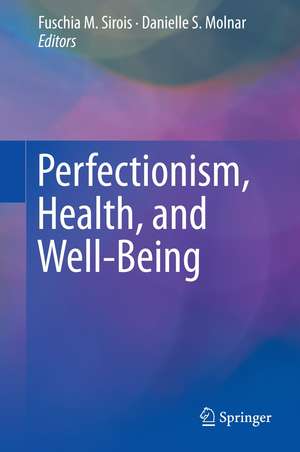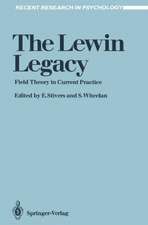Perfectionism, Health, and Well-Being
Editat de Fuschia M. Sirois, Danielle S. Molnaren Limba Engleză Hardback – 23 sep 2015
After presenting an overview of the conceptual and measurement issues surrounding the concepts of perfectionism, health, and well-being, three sections address the implications of perfectionism for health and well-being. The first of these sections provides an overview of research and theory on the role of perfectionism in health and illness, health behaviors, and chronic illness. The next section of the book focuses on the cognitive and affective underpinnings of perfectionism as they relate to psychopathology, distress, and well-being, including how it applies to eating disorders, depression, and anxiety. The final section of the book explores specific contexts and how they may contour the associations of perfectionism with health and well-being, such as in the domains of interpersonal relationships, academic pursuits, and work-related settings.
Perfectionism and wellbeing is a topic not just for researchers and scholars, but clinicians
and practitioners as well. For this reason, chapters also include a discussion of prevention and treatment issues surrounding perfectionism where relevant. By doing so, this volume is an important resource for not only researchers, but also for those who may wish to use it in applied and clinical settings. By presenting the latest theory and research on perfectionism, health, and well-being with a translational focus, Perfectionism, Health, and Well-Being makes a unique and significant contribution to perfectionism as well as general wellness literature, and highlights the need to address the burden of perfectionism for health and well-being..
Toate formatele și edițiile
| Toate formatele și edițiile | Preț | Express |
|---|---|---|
| Paperback (1) | 641.38 lei 6-8 săpt. | |
| Springer International Publishing – 23 aug 2016 | 641.38 lei 6-8 săpt. | |
| Hardback (1) | 647.73 lei 6-8 săpt. | |
| Springer International Publishing – 23 sep 2015 | 647.73 lei 6-8 săpt. |
Preț: 647.73 lei
Preț vechi: 762.04 lei
-15% Nou
Puncte Express: 972
Preț estimativ în valută:
123.94€ • 129.40$ • 102.58£
123.94€ • 129.40$ • 102.58£
Carte tipărită la comandă
Livrare economică 04-18 aprilie
Preluare comenzi: 021 569.72.76
Specificații
ISBN-13: 9783319185811
ISBN-10: 3319185810
Pagini: 300
Ilustrații: XII, 304 p.
Dimensiuni: 155 x 235 x 22 mm
Greutate: 0.62 kg
Ediția:1st ed. 2016
Editura: Springer International Publishing
Colecția Springer
Locul publicării:Cham, Switzerland
ISBN-10: 3319185810
Pagini: 300
Ilustrații: XII, 304 p.
Dimensiuni: 155 x 235 x 22 mm
Greutate: 0.62 kg
Ediția:1st ed. 2016
Editura: Springer International Publishing
Colecția Springer
Locul publicării:Cham, Switzerland
Public țintă
ResearchCuprins
1 Introduction: Conceptualization & Measurement of Perfectionism Danielle Molnar & Fuschia Sirois I. Historical and Emerging Research Perspectives I Perfectionism & Health 2 Historical Perspectives on Perfectionism & Health (draft already prepared) Gordon Flett et al 3 Perfectionism & Health Behaviours Fuschia Sirois 4 Perfectionism, Stress & Coping David Dunkley 5 Perfectionism & Chronic Illness Danielle Molnar & Fuschia Sirois II. Cognitive and Affective Underpinnings of Perfectionism 6 Perfectionism, Affect, & Well Being Patricia Marten DiBartolo (unconfirmed) 7 Perfectionism & Goal Appraisal Gordon Flett & Paul Hewitt 8 Perfectionism & Dysfunctional Cognitions (unconfirmed) III. Perfectionism and Wellbeing in Specific Contexts 9 Perfectionism & Relationships Simon Sherry 10 Perfectionism in the Workplace Joachim Stoeber 11 Perfectionism in Academic Settings Ken Rice.
Notă biografică
Dr. Fuschia Sirois is a Reader in the Department of Psychology at the University of Sheffield in the United Kingdom, and an adjunct Associate Professor at the University of Windsor where she was previously a faculty member. From 2011 to 2015 she held a Tier II Canada Research Chair in Health and Well-Being while she was a Professor in the Department of Psychology at Bishop’s University. She began studying the associations between personality, health, and well-being while completing her graduate studies at Carleton University (Ottawa) where she completed her Ph.D. in Social Psychology in 2003. She also received a pre-medical BSc. degree in Biochemistry/Nutrition from the University of Ottawa (1995) in addition to a BA hons. degree in Psychology (1996). Drawing from these diverse perspectives, Dr. Sirois's research is focused on understanding the psychological factors and qualities that may confer risk (perfectionism, procrastination) or resilience (self-compassion, future orientation) for physical health and well-being related outcomes through their links to self-regulation. She has published over 55 journal articles and book chapters on these topics, many in top tier peer-reviewed journals such as Health Psychology, Social Science and Medicine, Journal of Psychosomatic Research, Quality of Life Research, Personality and Social Psychology Bulletin, Self & Identity, Social and Personality Compass, Personality and Individual Differences, and the European
Journal of Personality. She is also the co-author of the Canadian editions of Shelley Taylor's popular Health Psychology textbook. Her research has been supported by the Social Sciences Research Council of Canada (SSHRC), and the Canadian Foundation for Innovation (CFI).Dr. Danielle Molnar is currently a Research Scientist at the Research Institute on Addictions, the State University of New York at Buffalo and an Adjunct Professor of Psychology at Brock University. She began studying the role of perfectionism in health and well-being in community and clinical samples of adults while completing her Ph.D. in Social/Personality Psychology at Brock University (St. Catharines, Canada) in 2011. Her current research is concentrated on understanding the underlying processes linking perfectionism to health, such as stress, as well as studying these pathways within the context of the interpersonal world in which they occur. To this end, a central focus of her work is on examining the relationship between perfectionism and health in the context of romantic relationships. Dr. Molnar’s work has been supported by the Social Sciences Research Council of Canada (SSHRC) and her research has been published in peer-reviewed journals such as Journal of Research in Personality, Personality and Individual Differences, Journal of Psychosomatic Research, Developmental Psychopathology, Psychology and Health, and the Journal of Studies on
Alcohol and Drugs.
Journal of Personality. She is also the co-author of the Canadian editions of Shelley Taylor's popular Health Psychology textbook. Her research has been supported by the Social Sciences Research Council of Canada (SSHRC), and the Canadian Foundation for Innovation (CFI).Dr. Danielle Molnar is currently a Research Scientist at the Research Institute on Addictions, the State University of New York at Buffalo and an Adjunct Professor of Psychology at Brock University. She began studying the role of perfectionism in health and well-being in community and clinical samples of adults while completing her Ph.D. in Social/Personality Psychology at Brock University (St. Catharines, Canada) in 2011. Her current research is concentrated on understanding the underlying processes linking perfectionism to health, such as stress, as well as studying these pathways within the context of the interpersonal world in which they occur. To this end, a central focus of her work is on examining the relationship between perfectionism and health in the context of romantic relationships. Dr. Molnar’s work has been supported by the Social Sciences Research Council of Canada (SSHRC) and her research has been published in peer-reviewed journals such as Journal of Research in Personality, Personality and Individual Differences, Journal of Psychosomatic Research, Developmental Psychopathology, Psychology and Health, and the Journal of Studies on
Alcohol and Drugs.
Textul de pe ultima copertă
This book brings together the world’s leading perfectionism researchers and theorists to present their latest findings and ideas on how and why perfectionism may confer risks or benefits for health and well-being, as well as the contexts which may shape these relationships. In addition to providing an overview of the latest research in this field, this volume explores new conceptual models that may help further our understanding of when, how, and why perfectionism may be implicated in health and well-being.
After presenting an overview of the conceptual and measurement issues surrounding the concepts of perfectionism, health, and well-being, three sections address the implications of perfectionism for health and well-being. The first of these sections provides an overview of research and theory on the role of perfectionism in health and illness, health behaviors, and chronic illness. The next section of the book focuses on the cognitive and affective underpinnings of perfectionism as they relate to psychopathology, distress, and well-being, including how it applies to eating disorders, depression, and anxiety. The final section of the book explores specific contexts and how they may contour the associations of perfectionism with health and well-being, such as in the domains of interpersonal relationships, academic pursuits, and work-related settings.
Perfectionism and wellbeing is a topic not just for researchers and scholars, but clinicians and practition
ers as well. For this reason, chapters also include a discussion of prevention and treatment issues surrounding perfectionism where relevant. By doing so, this volume is an important resource for not only researchers, but also for those who may wish to use it in applied and clinical settings. By presenting the latest theory and research on perfectionism, health, and well-being with a translational focus, Perfectionism, Health, and Well-Being makes a unique and significant contribution to perfectionism as well as general wellness literature, and highlights the need to address the burden of perfectionism for health and well-being.
After presenting an overview of the conceptual and measurement issues surrounding the concepts of perfectionism, health, and well-being, three sections address the implications of perfectionism for health and well-being. The first of these sections provides an overview of research and theory on the role of perfectionism in health and illness, health behaviors, and chronic illness. The next section of the book focuses on the cognitive and affective underpinnings of perfectionism as they relate to psychopathology, distress, and well-being, including how it applies to eating disorders, depression, and anxiety. The final section of the book explores specific contexts and how they may contour the associations of perfectionism with health and well-being, such as in the domains of interpersonal relationships, academic pursuits, and work-related settings.
Perfectionism and wellbeing is a topic not just for researchers and scholars, but clinicians and practition
ers as well. For this reason, chapters also include a discussion of prevention and treatment issues surrounding perfectionism where relevant. By doing so, this volume is an important resource for not only researchers, but also for those who may wish to use it in applied and clinical settings. By presenting the latest theory and research on perfectionism, health, and well-being with a translational focus, Perfectionism, Health, and Well-Being makes a unique and significant contribution to perfectionism as well as general wellness literature, and highlights the need to address the burden of perfectionism for health and well-being.
Caracteristici
Offers conceptual perspectives and theoretical models of perfectionism, health and well-being Gives an overview of the current state and recent advances in the field of perfectionism Highlights longstanding debates in the field such as the question of whether perfectionism has an adaptive component Provides direct practical applications for clinicians and service providers Includes supplementary material: sn.pub/extras


























